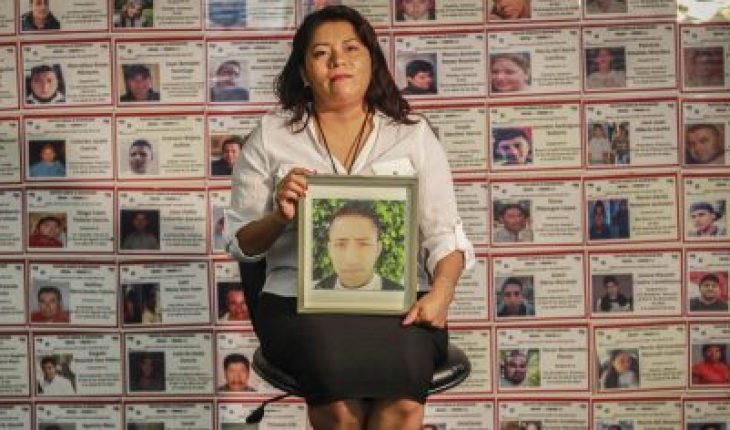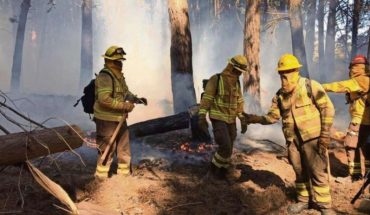On October 9 last year, very early, at 6 a.m., Angelica A received a message from her son Fernando José Trejo on her cell phone.
In the text, Fernando asks his mother to please prepare food for him and two friends, and put water to warm up because he wanted to take a bath.
“When I read the message I did what he asked me to do,” Angelica explains. I got up, put the water on and warmed up and made some food, some tacos.
But soon they gave ten in the morning, eleven, noon, afternoon… and Fernando didn’t show up.
“I sent him a message to demand why he didn’t come to the house to eat. But there was no answer anymore.”
Read: We do what the police don’t want to do: Laura has been looking for her missing son in Orizaba for eight years
Angelica didn’t know her son had disappeared since a day earlier.
“They took him in a police hold.”
Angélica Aguilar Victoriano is one of the mothers that make up the Orizaba-Córdoba Collective of Missing Persons, in the central area of the state of Veracruz.
Like many of the families that make up this brigade, Angelica has been able to search for Fernando for five months because of the COVID pandemic. But now, with the change of epidemiological traffic light in the entity, he has restarted the terrible routine of going to track his child in hospitals, commands and clandestine pits.
As she sweetly caresses the painting with her son’s photo, Angelica then recounts what the day went after her son showed no signs of life.
Angelica explains that the next morning she receives a phone call from a person who does not identify and asks about Fernando.
She replies that the last thing she knows about him is that she went to work in Ixhuatlán, a small Veracruz town located a few 40 kilometers from Orizaba, in the downtown area of Veracruz. But the voice on the other side of the call advises him to look for his son, because a couple of days earlier there was a retainer in another town very close to Orizaba, Ixtaczoquitlán, where some policemen had taken him.
Nervous, and still incredulous, Angelica begins making calls to ask if her son had been arrested in Ixtaczoquitlán Police Command. It demands to know where your son is who has allegedly been arrested in a retainer. But no one gives you an answer.
Find out: Collectives restart search for missing persons in Veracruz after five months of pause for epidemic
She is sent to ask the police in Fortín de las Flores, a town about 12 kilometres from Orizaba. But there they also tell her that they know nothing about Fernando, and send her back to Orizaba, where they assure her the same thing.
Desperate, Angelica returns to Ixtaczoquitlán. There he waits several hours for the commander to arrive, who insists that they know nothing of his son and that on October 8 they did not install any retainers in the area of the former tuxpango, where they allegedly had been disappeared by policemen. They even passed it to the separates to verify that Fernando was not actually there.
After also passing through the Regional Hospital of Río Blanco, Angelica returns home. Her husband, who informs her that two other young women, Ciro Alvarez Cantor and Martín Flores Medina, are also missing and apparently encountered Fernando. All three were friends and were traveling in a van.
Angelica talks to Zuleima Flores, Ciro’s wife, and they exchange information about what might have happened.
“I told him that my son had sent me a message very early. And she told me it was weird, because October 8 was also the last time she had contact with her husband, and that day was when the retainer stopped them,” Angelica explains.
Among her findings, Fernando’s mother believes the captors turned off her son’s cell phone the day she was taken away. And that, for some reason, the next day they turned it on, and that’s why he got the text message out of date on the morning of October 9.
Read: Missing: Between Hope and Doubt towards the Government
At first, Angelica says, the families of the three missing don’t want to file the complaint, thinking maybe they could be kidnapped and at any moment they’ll ask for ransom for them.
And, indeed, a short time later they receive a call demanding a ransom. They manage to collect 80 thousand pesos that deposited the captors, in the hope that they will return the boys alive.
The kidnappers say they will deliver the youngsters to TheIzaba Castle Park at 6pm. But the families wait until late at night and the boys don’t show up.
A few days later, the captors contact the families again to ask them for more money. Angelica already suspects that, in reald, it’s an extortion to keep taking money out of them over and over again. They decide not to deposit them and now they do.
Since that day, they haven’t stopped looking for their relatives.
A frozen duel
Nearly a year after Fernando’s disappearance with her two friends, Angelica explains that she always goes out on the street in the hope of making her son’s case visible, in order to get a clue that could lead her to her whereabouts.
“It’s been over 10 months and we don’t know anything about them. It’s nerve-wringing. He doesn’t know the food of thinking about where he’ll be, if he’ll be fine, if he’ll be cold, or if he’ll be eating,” says Angelica, who with Zuleima and Reyna Valiente, the wives of the other two missing young men, have formed a “brotherhood”: all three are accompanied in pain, lean on, and go out in their quest.
Angelica says her 10-year-old son is the one who asks the most when her brother is coming back, especially because she sees her mom come out looking for him and always comes back without him.
Searching for Fernando has led Angelica to leave his other children alone. But she thinks she can’t stand by and do nothing to find him.
There is no day when I stopped remembering his smile, his dreams, his optimism, his desire to live and succeed.
His life is paused, with a wound, with a frozen duel, from which Angelica says he will not be able to leave until he finds it.
What we do at Animal Politics requires professional journalists, teamwork, dialogue with readers and something very important: independence. You can help us keep going. Be part of the team.
Subscribe to Animal Politics, receive benefits and support free journalism.#YoSoyAnimal





